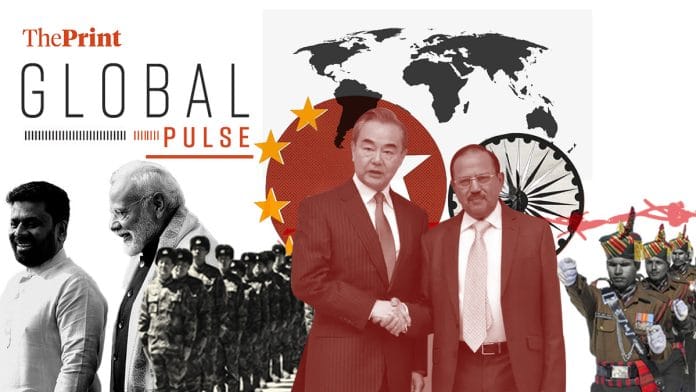New Delhi: There are decades when nothing happens, and then there are weeks when decades happen: that’s what the rollercoaster of Indo-China relations feels like.
In a sign of progress, Indian National Security Adviser Ajit Doval and Chinese Foreign Minister Wang Yi held talks in Beijing under the special representatives’ format for the first time in five years.
The discussion centred around ensuring peace on the ground and that the border issues don’t cost the “normal development” of bilateral relations, the Indian readout from the meeting said. Chinese media hailed a “six-point consensus”, mentioned only in the Chinese readout, as a positive step in that direction. The readout did not give further details.
“The meeting is beneficial for fostering mutual trust between the two countries and contributes to the maintenance of peace and tranquility in the border regions,” said the Global Times report ‘23rd meeting of Special Representatives for China-India Boundary Question reaches six points of consensus.’
The meeting indicates that “both sides are actively working to resolve the border issue and taking actions to further restore mutual trust”, they added.
The long report summarising the Chinese stance says that, as “two major developing countries, representatives of emerging economies, and important members of the Global South,” a healthy relationship that also aligns with the interests of nearly 3 billion people between both countries is of vital importance.
And it looks like the Chinese are happy with their chosen negotiator: the meeting between Doval and the foreign minister was a platform for “for the heads of diplomatic and security affairs from both sides to engage in direct communication”, the Global Times report further adds.
A Xinhua report on a meeting between Doval and Chinese Vice President Han Zheng quotes Han as saying that India and China are both “ancient oriental civilizations and emerging major powers” and should “adhere to independence, solidarity and cooperation, which is of global influence and strategic significance”.
The same story quotes Doval as saying that India is “willing to strengthen strategic communication with China, expand mutually beneficial cooperation and inject new impetus into the development of bilateral relations”.
An Associated Press report—titled ‘China and India agree to work on solution to their border dispute in the Himalayas’— on the developments says both countries are finally working towards a solution to the long-running border dispute.
“The two sides would seek ‘fair and reasonable’ solutions and formulate a roadmap, undertaking the easier steps first and dealing with the tough ones later,” the article says, citing a statement from the Chinese foreign ministry.
Such a measured attitude comes after plenty of India-bashing in Chinese media.
The Global Times has been watching Indian media closely: several editorials and news articles have taken umbrage with the style in which Indian media reported Sri Lankan President Anura Kumara Dissanayake’s visit to New Delhi earlier this week.
Sri Lanka’s newly elected leader chose India as its first state visit and Chinese media has bristled over Indian media highlighting this.
One Global Times opinion headlined ‘‘Big win’ narrative of Indian media shows New Delhi’s unease, lack of confidence,’ says, “Regarding the choice of visits by Nepal and Sri Lanka, whether India is worried or cheering for victory, it is forcing regional countries to choose sides between China and India.”
It adds, “In sharp contrast to India, China does not require small- and medium-sized countries in South Asia to choose sides; rather, it hopes that these countries will make choices that are most beneficial to their own futures – specifically, to work with relevant countries to promote regional peace, stability and development. This is why China-Sri Lanka relations have remained steady over the years.”
The article goes on to accuse Indian media of trying to sow seeds of discord between China and Sri Lanka, also adding that “forcing regional countries to choose sides and adopt an ‘India first’ foreign policy reflects India’s long-held, bossy and narrow-minded attitude toward other countries in South Asia”.
One expert is rather harsh in describing India’s mindset as “sour grape, paranoia, and pomposity”.
Yet another story in the Global Times on the same theme—headlined ‘Some Indian media attempt to sow discord between China, Sri Lanka during Dissanayake’s India visit, exposing a zero-sum mentality: expert’—says Indian media has an “outdated perspective.”
“Indian media should reflect on why many South Asian countries have increasingly distanced themselves from India in recent years and even opposed India,” the article says.
“The attitude of Indian media manifested through interference in South Asian countries’ affairs and unequal treatment, has to bear certain blame, as such an attitude has resulted in inevitable backlash from these nations and their civil societies.”
“Sour grapes, paranoia, and pomposity” indeed.
(Edited by Sanya Mathur)
Also Read: Delhi’s relationship with Dhaka may be edging towards open hostility, says global media






